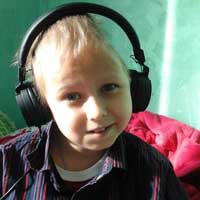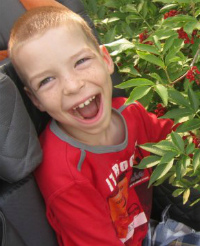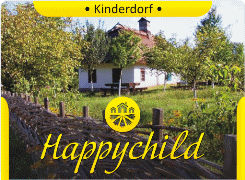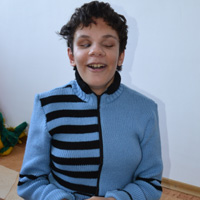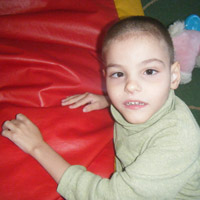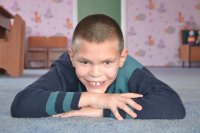|
Kranke Kinder brauchen Hilfe!
|
Published: 2015-04-21 13-00-00 Viewed, times: 4918

Stas Andrusik, born on 21 February 2003
Diagnosis: Ameloblastic Fibrosarcoma, Third Recurrence.
ATTENTION! ON ON 05/01/2016 AS of: Fundraising is closed!!
Our Stasik is now being treated in Russia, and it is supported by local funds
=====================================
In March 2013, a tragedy came to our family.
Our only son was diagnosed with a tumor in his oral cavity, in the upper palate. He was referred to the Maxillofacial Department of the Fifth Zaporozhzhye City Hospital. The doctors made a decision to remove the tumor. The surgery went smoothly, with a tumor having the size of an adult manТs fist removed. Besides, part of the upper jaw affected by the tumor also had to be removed. The histological analysis defined the tumor as the ameloblastoma of the upper jaw. Ameloblastoma is a benign tumor, and with a right surgical intervention it does not give recurrences. We calmed down but as it appeared it was too soon.
In October of the same year, a recurrence of the disease was diagnosed at the follow-up computer tomography. It was at the same place and had approximately the same size. I will not describe our emotional state; I think you can imagine how bad we felt. This time we were referred to Kiev, to the Chief Maxillofacial Surgeon of Ukraine, Professor Malanchuk. He agreed to operate on our boy, but before the surgery he prescribed a course of immune correction based on such drugs as Lymphomyosot and Polyoxidonium. Meanwhile, the tumor was growing rapidly and aggressively, as doctors told us afterwards it might have been caused by those drugs the boy was taking.
When after three weeks of the prescribed treatment, I hurried to Kiev, frightened with the rapid growth of the tumor, to consult our doctor, I had to run around the institute trying to get his attention and crying УDoctor, please help us, our boy is dyingФ. In reply, the professor was only waving me aside telling that he was late to some scientific committee. At the end, he just refused to operate on the boy. Okhmatdet, which is the main Ukrainian clinic for children, also refused to help us, saying that they had a waiting list for six months ahead.
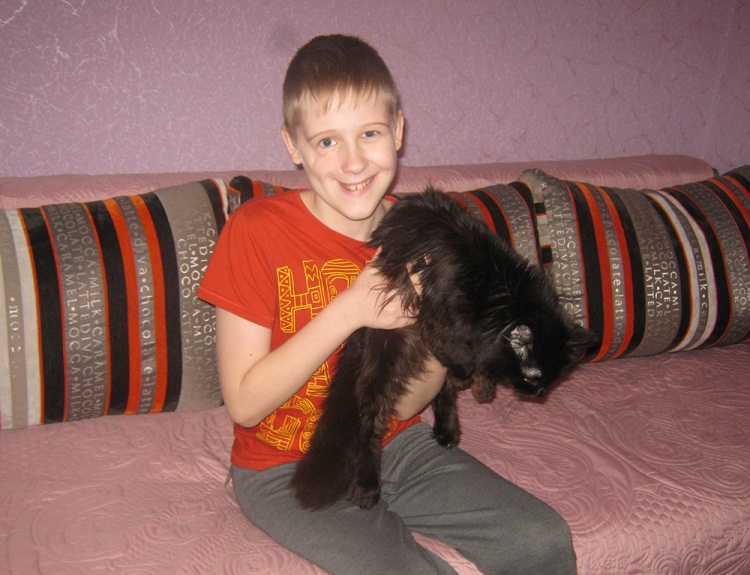
But by a twist of fate I managed to find the Seventh Kyiv ChildrenТs Hospital, which had a Maxillofacial Department. It was late night when I finally met the Head of Department, a wonderful surgeon and a person with kind heart, Gennadiy Korotchenko. Despite the fact that he came back from a long and complicated surgery, he found time to see me and to review our documents. His verdict was an urgent operation. So I came back to Zaporozhzhye to bring our child to the capital. We passed all the required tests very quickly and in a couple of days all our family went to Kiev. In the meantime, the tumor was growing, it grew down to the mouth from the maxillary sinus and you could almost see it growing. When we went to Kiev, our boy was not able to close his mouth as the tumor was so big. Besides, apparently its necrosis started as it became black and was stinking.
In a couple of days, our son went through a surgery, and the tumor was removed through his mouth. After the surgery, our doctor told us a terrible thing. He thought that the tumor must be malignant as it grew through the neighboring tissues and affected bones. Worrying, we were waiting for the histological test results. At the same time, our doctor referred us to the National Cancer Institute to the Professor Vladimir Protsik, Director of the Head and Neck Tumor Department. All the doctors were telling us that he was a distinguished oncology specialist, so we could see some silver lining. The best experts in Ukraine examined our tumor, carried out a histological test, IHC test and told us their final diagnosis - Ameloblastic Fibrosarcoma, G1 tumor, a very rare disease. The life sometimes gives us such kind of УbonusesФ. Besides the boy went through a follow-up MRI, which showed that the tumor was removed only partly. It appeared that during the period of time we lost due to Malanchuk, the tumor went further to the temporal region.
Another surgery was scheduled, now in the Cancer Institute. It was scheduled after the New Year celebrations at the end of January 2014. We went back home. It was the saddest New Year Eve in our lives. Only our son was full of joy, not realizing how bad the situation was. As scheduled, the surgery was conducted and brought us some unpleasant surprises. Due to the wide spread of the tumor and high level of the damage caused to the surrounding tissues, the doctors had to cut the face, from the temple to the lower side of the upper lip. Large fragments of the upper jaw were to be removed, up to the eye pit, the cheek bone and the damaged soft tissues. After the surgery, the boyТs face looked terrible and our spirits were really low.

Nevertheless, the life went on, we were released from the hospital with no treatment prescribed as we were told that this tumor was not sensitive to chemo or radiation therapy. We came back home. After some bureaucratic formalities, Stas was assigned a group of disability. He could not attend school as he had problems speaking and eating; besides, his post-surgery wounds were healing slowly. Thanks God, our school respected our needs and provided us with an opportunity to study at home. The boyТs teachers came to our place to teach him. Besides, the school initiated a fundraising campaign and collected a rather big sum of money for us. We really appreciated it as our family budget suffered greatly due to our two recent surgeries.
The wounds were slowly healing, both physical and emotional, and in 2 months we went to Kiev for a follow-up MRI. The tests showed lack of the neoplastic process, so we saw a silver lining again. We met various doctors and experts, discussing the possibilities to reconstruct the removed bones and soft tissues. Then we went back to Zaporozhzhye and in about a week an unpleasant surprise was waiting for us Ц in the post-surgery cavity we found a pea-size neoplasm. We started calling doctors and asking questions. It appeared that they saw it during the examinations but didnТt think that it was important. Some said that it was evagination of the inferior turbinate; others Ц that it was a fibrous polyp, which sometimes can occur at the surgery sites, but there were also some who did not exclude the possibility of tumor recurrence.
For some time we were observing the УpolypФ and after a while realized that it was growing. Then we decided to make biopsy and in two weeks we got the shocking news that it was our tumor again. It appeared that it sometimes leaves its roots in bones which lead to recurrence of the disease. We felt really pessimistic and started getting ready for another operation. We couldnТt make ourselves tell our son about it. But when he finally learned the bad news, the boy was devastated; he kept asking why he needed a life like this at all. It was horrible to hear such words from an 11-year-old. We were slowly but steadily falling into depression. Additional CT and MRI tests brought us another piece of news: now Stas had two tumors, one in the upper palate and the other one in the temporal region, not far from the eye pit.
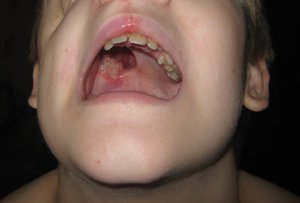
The surgery was conducted in the National Cancer Institute again, with Professor Protsik operating. The doctors had to open the face again and remove part of the upper palate and remains of the cheek bone. The histological test brought us another surprise Ц now the tumor was classified as G2 meaning that it was more malignant. On 17 July 2014, we were released from the hospital and the council of doctors recommended us to go through radiation therapy of the post-surgical area. Now we face a difficult dilemma. On the one hand, it would be good to take the measures recommended by the doctors to prevent further recurrences of the disease. On the other hand, Professor Protsik told us that his surgery was radical to the maximum extent possible and, besides, this tumor is radio-resistant, i.e. it is not very sensitive to radiation. It means that this treatment with questionable effect will imply the risk of further malignization of the tumor, compromised immunity and growth retardation of the radiated area. Moreover, the surgery to reconstruct the jaw through osteoplasty may be unreasonable due to the fact that radiated areas hardly accept transplants.
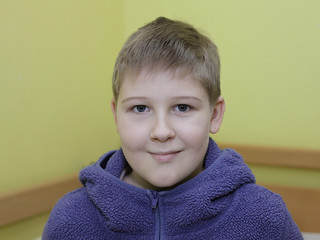
Now our best option is going to Moscow with all our medical records, tests, slides and histology results. To make it possible, we need about UAH 40,000 (approximately 1,670 US dollars) for examinations and selection of further treatment approach.
The family is trying to raise the necessary funds through friends and acquaintances, but past treatment has already depleted all possible financial resources. Dear friends, letТs not stay indifferent to StasТs life and health.
The family lives in the city of Zaporozhzhye, Zaporozhzhye region.
Contact phone of the boyТs father, Yuri Vladimirovich +38 093 326 30 97.
Diese Veroffentlichung ist mit folgenden Kategorien verbunden:
Veroffentlichungen durch Gluckliches Kind Kranke Kinder in der Ukraine Vormalige Hilfsgesuche von kranken Kindern
Veroffentlichungen durch Gluckliches Kind Kranke Kinder in der Ukraine Vormalige Hilfsgesuche von kranken Kindern
|
Aktuelle Projekte:
|
Unsere Berichte:
|
|
Ukrainische Waisen suchen eine Familie:
|



